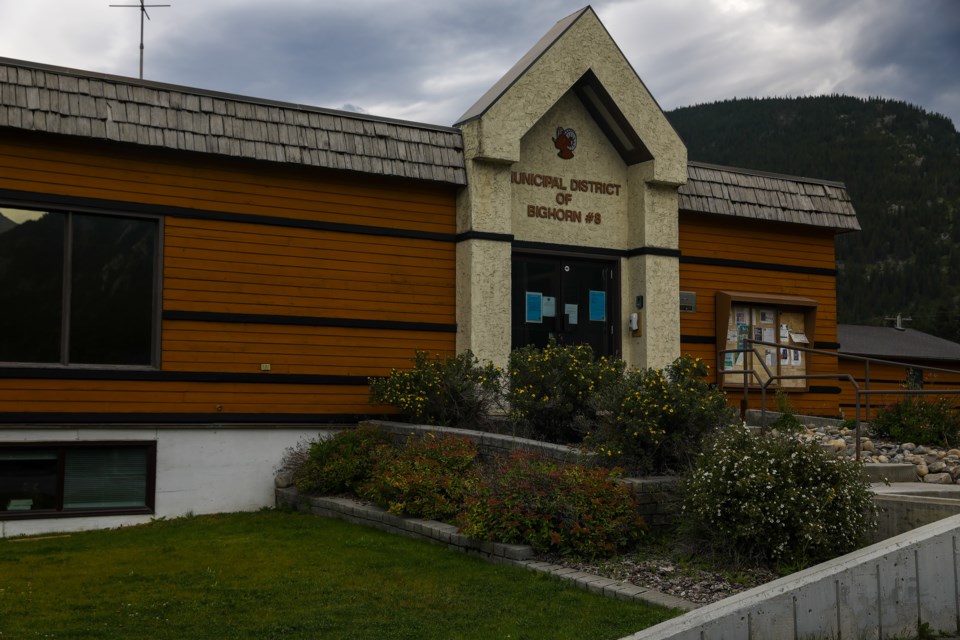MD OF BIGHORN – After lengthy discussion, MD of Bighorn council gave second reading to a laundry list of over 60 amendments to its land use bylaw last week.
Council’s approval adds another 20 proposed edits since it gave first reading to the amended bylaw in November 2022. The changes include lengths of development permits and renewals for visitor accommodation suites and bed and breakfasts, defining wet bars, and discretionary uses for rooftop decks.
While many of the revisions are administrative in nature – adding definitions and updating wording around existing sections – councillors questioned the rationale behind other proposed suggestions.
“I hear from council that we’re supportive of making changes that will make [the bylaw] better for everybody, but I think we just want to make sure we understand why those changes are occurring and make sure we know a little bit more background information,” said MD of Bighorn Reeve Lisa Rosvold at council's Sept. 12 meeting.
“We have learned you don’t know what you don’t know, and you don’t know what questions to ask if you don’t know, too. Having that opportunity to have a more robust discussion will give us more time to ask questions that we don’t necessarily know yet.”
Rosvold and others around the table questioned new language in the bylaw defining wet bars versus kitchens, aimed at preventing illegal secondary suites.
“I understand where the desire to define this came from and you want to make sure that there are not essentially illegal suites happening because of a wet bar,” said Rosvold. “But then, for people that don’t have illegal suites, I also want to make sure that if they have a movie theatre room, they can have a little bar in there. Or, if they have a sink in their garage … it’s not necessarily a wet bar but would it be defined like that?”
The bylaw defines a wet bar as being used “solely for drink preparation, while a kitchenette allows for the preparation of both drinks and food.”
Bighorn’s acting director of planning services Jenny Kasprowicz said the distinction was also added to the bylaw to give clarity to development officers reviewing development permits.
“The development officers were having trouble with [distinguishing] what is a second kitchen and what’s a wet bar, and without a definition, they couldn’t distinguish that because a lot of wet bars now are the size of kitchens,” she said.
“We wanted to distinguish between something that is used to make drinks and entertain people versus something that you’re cooking with every day and serving food.”
It’s a “slippery slope” when a dwelling has unlawfully developed a second kitchen, Kasprowicz added.
A staff report notes there have been previous enforcement issues with wet bars in bed and breakfast operations being used as kitchens, thus forming unpermitted visitor accommodations.
The MD’s land use bylaw permits one kitchen per dwelling unless approved by the development authority for specific cases like accessory use or for major home-based businesses, but not for the creation of a studio or secondary suite. A development permit is not required for a wet bar.
A public hearing for the proposed land use bylaw amendments was held in January, where residents with concerns relating mostly to changes to development permits and renewals were heard.
The bylaw aims to help streamline the development process and provide clarity to both planning staff and applicants by adjusting permit renewal periods for bed and breakfasts and visitor accommodations, and removing renewal requirements for secondary suites, as well as removing one-year trial development permits.
Administration found no issues with removing the trial one-year permit, as most applicants have been able to easily secure full renewals. It was removed from the land use bylaw for efficiency, but enforcement remains, with stop orders possible for non-compliance with permit conditions.
In earlier discussions of the revisions, council requested a workshop with administration to do a deep dive into the proposed changes and better understand potential impacts on residents and ratepayers, as there are still concerns after the public hearing.
The workshop was expected to take place sometime between first and second readings of the bylaw but is now set to occur before it’s brought to council again for potential third reading.
Council adopted its land use bylaw in September 2018, but several amendments have been approved by council on an application-by-application basis.
If approved, new to the land use bylaw would be replacing the Alberta Building Code with the National Building Code – 2019 Alberta Edition, as well as the discretionary use of rooftop decks under all Bighorn districts, except industrial.
At first reading of the bylaw, a rooftop deck was listed as a discretionary use for all districts.
Rosvold raised concern about the change and how industry within the MD would be affected by the bylaw, now and in the future, as the impacts are not well understood by council.
“How are those districts that are missing, that can’t have rooftop decks, how are those people impacted? Do any of them currently have a rooftop deck that will now be out of compliance? Why are those districts that are now missing from the list not allowed to be included in the list?” she asked.
Coun. Jen Smith, who is a council representative on Bighorn's Municipal Planning Commission, agreed a workshop with administration to provide better clarity and explanation to council on the changes will be helpful, but said she feels, overall, the revisions will simplify the land use bylaw for Bighorn staff and applicants.
“Going through it and flipping back and forth, and then putting it through with documentation I have and applying it to things that come through MPC – it will simplify life when we get to MPC, it will be more clear for the applicants on what can happen.”
The Local Journalism Initiative is funded by the Government of Canada. The position covers Îyârhe (Stoney) Nakoda First Nation and Kananaskis Country.




